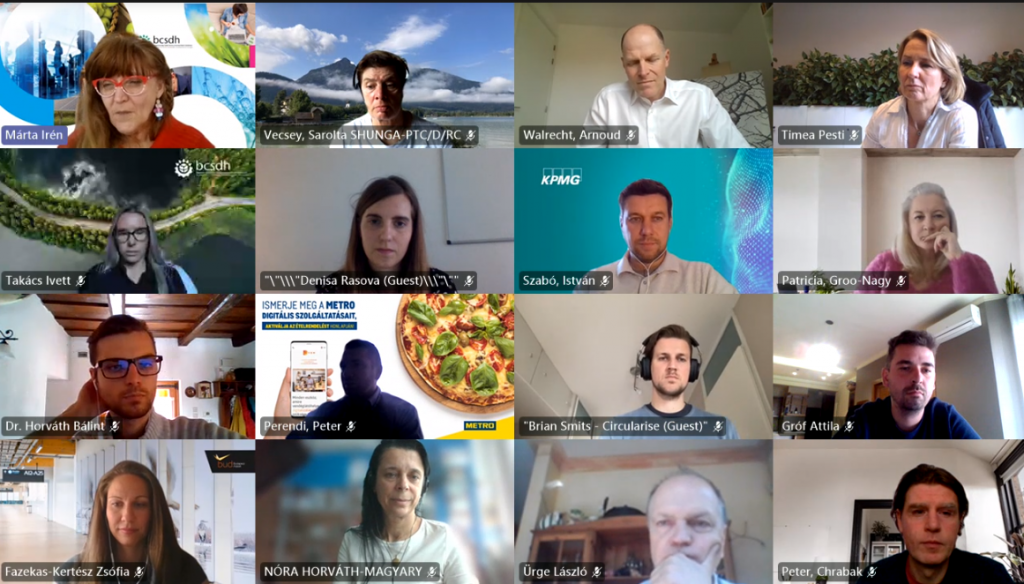What is the future of packaging? Are there innovative solutions that can solve the problem? What can companies do? Yesterday, the third and the last episode of Circular Economy Academy was held with the participation of more than 30 company representatives.
As the founder of the Circular Economy Platform, H. E. René van Hell, ambassador of the Embassy of the Kingdom of the Netherlands gave an inspirational welcome speech to the participants about the successful cooperation of the Circular Economy Platform and its founders. He gave an insight of the first and second episode of the Academy and highlighted on the trends of measurement tools, food waste, and packaging.
Firstly, Dorottya Kovács, Communication specialist of the Coca-Cola HBC Hungary has presented the Coca-Cola first paper bottle pilot project, which is currently running in Hungary. She spoke about the commitments and activities of Coca-Cola on the field of packaging. At Coca-Cola by 2030, all primary packaging must be 100 % recyclable, and 100% of beverage packaging should be collected. To do so, Coca-Cola is working in 2 pillars. First is the reduction of packaging, and the second is innovative packaging, which contains the paper bottle prototype. 2000 Hungarian consumers can be the first to participate in the first European market test in Hungary. The plant-based AdeZ drink is offered through a partnership with Kifli.hu, which is one of the Hungary’s fastest growing online grocery retailer. After using the bottle, consumers are pleased to share their feedback about the bottle. The used bottles are being collected, so that developers can examine how the material has reacted to transportation and use.

After that, participants could learn about 3 innovative businesses, which are solving the problem of the single-used packaging. Envirocare was introduced by Ivana Birová, project manager of Envirocare. This Slovakian company is focusing on research of ecological bioplastic and Panara, the producer together has developed a nonoilen. Nonoilen is a thermoplastic material based full on bio-based polymers and is fully biodegradable without any synthetic polymers and compared to other plastic, it helps improve mechanical properties (flexibility, shape stability) and it all has food-contact certification.
A Hungarian innovative company, Greenstic has also been introduced by Márton Bati, co-owner of the company. Greenstic was established 2 years ago, and has more than 290 compostable, plastic-free products. These are made from sugarcane, paper, recycled paper, and PLA and are designed by them or some are designed exclusively for a certain customer of theirs. The company is working together with restaurants, catering services and warehouses. The most important impact of the COVID was the growing home delivery services and the reduction of the event and festival business. The Hungarian law about banning some of the single used plastic has generated a customer demand. In the future, greenstic will use new plant based raw materials, like mushrooms, potato, grape skin, milk, hemp.
Marteen Stolk, Business Developer has introduced the activities of Ioniqa, a Dutch company, which is working with sustainable plastics. It recycles the un-recyclable PET waste, by doing so it contribute to a closed loop system for PET Plastic. It takes the rubbish PET, makes a high-quality monumer out of it which can be used by PET manufacturers. All the PET which could not be recycled will be brought back to the value chain. It will be 100% recycled, 75% less CO2 emission, and price and quality competitive to oil. Ioniqa is the first operational plant supplying the largest global PET manufacturers in the world, like Unilever and Coca-Cola.
As closing of the event, Bálint Horváth, Circular Economy Officer at the Embassy of the Kingdom of the Netherlands summarized the Circular Economy Academy webinar-series and asked the participants to indicate the topics that they are interested in the future.
The Academy will be continued next year.



